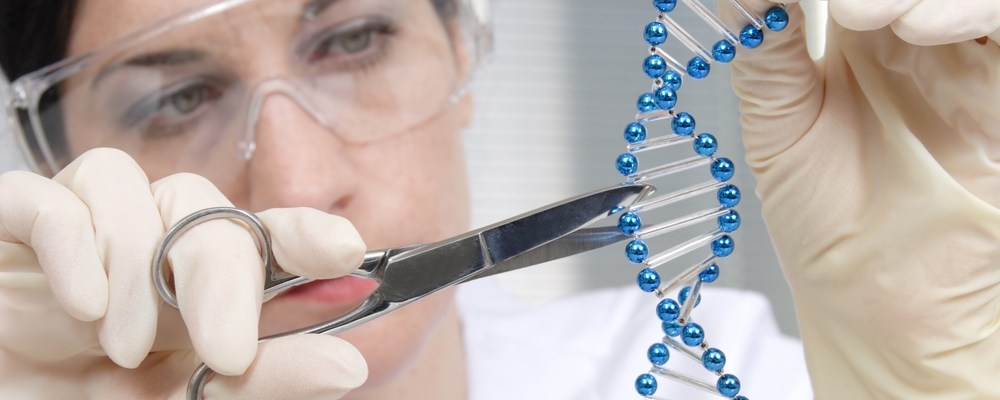|
Scientists today use biotechnology to insert and remove genes, altering characteristics in various organisms. This process of “genetic engineering” involves manipulating an organism’s genome—the collection of genetic material, including DNA and RNA. Interestingly, these techniques utilize naturally occurring organisms and phenomena. Many organisms possess DNA editing tools, such as nuclease enzymes, that regulate DNA reproduction. Scientists use these enzymes to selectively cut pieces of DNA. Remarkably, viruses are actually rudimentary agents that manipulate the genomes in your cells. Whenever a virus infects a cell, the virus inserts genetic material into a cell to hijack the cell’s resources in order to make copies of the virus. Scientists and doctors utilize this process to insert pieces of DNA into an organism as a form of gene therapy or for molecular manufacturing purposes.
While we have not gone as far as designing babies, we have successfully used genetic engineering in areas like agriculture and science. For instance, pest-resistance genes have been introduced into various crops, improving yields. Further, scientists use genetically altered cells to model diseases to test drug effectiveness. They are even using genetic engineering to alter human cells for study, selectively adding and removing oncogenic genes to determine their roles in cancer. While it is theoretically possible to alter genes in a human embryo, commitment to ethical research has so far prevented such feats. However, the wall of ethics seems to be crumbling under the pressure to push the boundary of science. A research group in China caused considerable debate when it recently published its research on employing genetic engineering to alter human embryos. In this study, the research group investigated the use of CRISPR/Cas9, a specific gene-editing tool, in human cells. They believed there was a “serious knowledge gap” in our understanding of DNA repair mechanisms in early human embryos. To assuage ethical concerns, the team used tripronuclear (3PN) zygotes, egg cells fertilized by 2 sperm, which do not develop normally into humans. The scientists found that CRISPR/Cas9 was able to remove the target gene, but that the embryo’s gene repair mechanism was not effective. Further, the CRISPR/Cas9 was not specific and cleaved non-target genes. The study highlighted the shortcomings of the CRISPR/Cas9 gene editing tool in removing specific genes. Even more pressing, the scientists raised alarm for genetically modifying human embryos for research, even if those embryos would not fully develop. It is important to consider the possibilities and implications of genetically altering normal embryos that will develop into full grown humans. Even though many question the ethics of genetically engineering babies, such measures can offer immense benefits to some. For now, gene therapy is still limited in its effectiveness. For children born with life-threatening defects, it simply is not fast enough to save them. Further, curing some diseases requires altering every cell in the body. For Down’s Syndrome, the embryo offers a more promising pathway for a cure. People with Down’s Syndrome have an extra 21stchromosome. Deleting the extra chromosome 21 during the embryo stage ensures that future cells of the fetus will have the normal number of chromosome 21. The embryo would develop normally after the genetic modification. In some cases, genes can cause irreversible defects once the child matures, and the disease-causing gene must be identified and corrected early. If doctors wait until adulthood to remove the disease-causing genes, some organs like the brain may not be able to recover. On the other hand, genetically engineering humans has many potential drawbacks. Such procedures are expensive and would thus discriminate against the poor. Citizens in poorer countries and communities would not have equal access to the technology. Just like how plastic surgery has been used to help burn victims as well as for purely cosmetic purposes, the power of genetic engineering lends itself to arbitrary use. The enticing idea of buying superior intelligence or athletic ability could lead many to use genetic engineering simply for their personal improvement, rather than for saving lives or curing devastating diseases. Genetically engineering babies could create a group of humans with superior abilities. In turn, cultures that overvalue “natural” genetics would arise, paving the way for a new type of discrimination against those born “without modification.” Not to mention, the environment clearly plays a critical part in a child’s development. Humans may overlook the environment, perhaps offering less quality care with the belief that the “perfectly made” child would inevitably become successful. Further, natural selection is still at play. Many people may opt to have a “useful” gene, decreasing genetic diversity. If the environmental conditions change suddenly against the once “useful” gene, there is a chance that many people with that gene would be wiped out by selective pressures. For example, having two copies of the sickle cell gene causes the disease, but having one copy makes one immune to malaria. A malaria outbreak could kill many if most people chose to not have any copies of the sickle cell gene. Considering both benefits and drawbacks, I cannot in good conscience support genetic engineering without the strictest regulations and ethical education. Just because we can do something does not mean we should. Nazi and Japanese human experimentation in WWII offer clear cases when science was used unethically. I have no doubt that we will eventually have the technology to safely modify an embryo‘s genome—allowing doctors to selectively and accurately alter physical development. Once technology has reached that point, the floodgates have opened. Black markets and loose law enforcement would make it almost impossible to ensure that the technology not be misused. Everyone, especially doctors, must understand the potentially horrible ramifications of misusing genetic engineering. Through a combination of law and ethical education, people will hopefully use genetic engineering in a responsible manner.
0 Comments
Leave a Reply. |
Categories
All
Archives
April 2024
|

